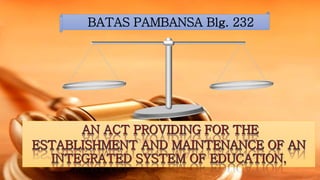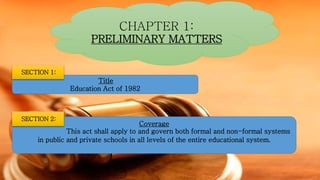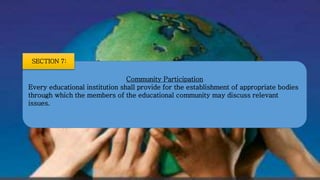Batas Pambansa Blg. 232
- 1. CHAPTER 6: LESSON 3
- 2. BATAS PAMBANSA Blg. 232
- 3. BATAS PAMBANSA Blg. 232 The Education Act of 1982 PROMULGATED: September 11, 1982 LEGAL BASIS: 1. Constitution of 1935, Article XIV section 5 2. Constitution of 1975, Article XIV section 8(1-8) 3. Constitution of 1987, Article XIV section 1-5(5)
- 5. CHAPTER 1: PRELIMINARY MATTERS Title Education Act of 1982 SECTION 1: Coverage This act shall apply to and govern both formal and non-formal systems in public and private schools in all levels of the entire educational system. SECTION 2:
- 6. CHAPTER 2: DECLARATION OF BASIC STATE POLICY AND OBJECTIVES Declaration of Basic Policy policy of the state to establish and maintain a complete, adequate and integral system of education relevant to the goals of national development. SECTION 3:
- 7. NATIONAL DEVELOPMENTAL GOALS: 3. To achieve and strengthen national unity and consciousness and preserve, and develop and promote desirable cultural, moral and spiritual values in a changing world. 2. To assure the maximum participation of all the people in the attainment and enjoyment of the benefits of such growth; and 1. To achieve and maintain an accelerating rate of economic development and social progress;
- 8. The State shall promote the right of every individual to relevant quality education, regardless of: sex, age, creed, socio- economic status, physical and mental conditions, racial or ethnic origin, political or other affiliation
- 9. CHAPTER 2: DECLARATION OF BASIC STATE POLICY AND OBJECTIVES Declaration of Objectives The educational system aims to: SECTION 4: 1. Provide for a broad general education that assist each individual, in the peculiar ecology of his own society, to a. attain his potential as a human being. b. enhance the range and quality of individual and group participation in the basic participation of society; and c,. Acquire the essential educational foundation of his development into a productive and versatile citizen;
- 10. 2. Trains the nations manpower in the middle level skills required for the national development; 3. Develop the professions that will provide leadership for the nation in the advancement of knowledge for improving the quality of human life; and 4. Responds effectively to changing needs and conditions of the nation through a system of educational planning and evaluaton.
- 11. Inculcate love of country teach the duties of citizenship develop moral character personal discipline scientific, technological , and vocational efficiency reach out to educationally deprived communities All educational institutions shall:
- 12. II. THE EDUCATIONAL COMMUNITY
- 13. CHAPTER I: PRELIMINARY PROVISION Declaration of Policy and Objectives is likewise declared government policy to foster, at all times, a spirit of shared purposes and cooperation among the members and elements of the community, and between the community and other sectors of the society. SECTION 5:
- 14. 1. Aid and support the natural right and duty of parents in the rearing of the youth through the educational system. 2. Promote and safeguard the welfare and interests of the students by defining their rights and obligations, according on privileges, and encouraging the establishment of sound relationships between them and the other members of the school community. 3. Promote the social and economic status of all school personnel, uphold their rights, define their obligations, and improve their living and working conditions and career prospect. 4. Extend support to promote the viability of those institutions through which parents, students and school personnel seek to attain their educational goals.
- 15. Definition and Coverage “Educational Community” refers to those person or group of persons as such, or associated the institutions involved in organized teaching and learning systems. SECTION 6: Members and Elements of the Educational Community 1. Parents 2. Students 3. School Personnel
- 16. 3. School Personnel A. TEACHING OR ACADEMIC STAFF B. SCHOOL ADMINISTRATORS C. ACADEMIC NON-TEACHING PERSONNEL D. NON-ACADEMIC PERSONNEL 4. Schools
- 17. Community Participation Every educational institution shall provide for the establishment of appropriate bodies through which the members of the educational community may discuss relevant issues. SECTION 7:
- 19. Rights of Parents SECTION 8: 2. The right to access to any official record directly relating to the children who are under their parental responsibility 1. The right to organize by themselves and/or with teachers for the purpose of providing a forum for the discussion of matters relating to the total school program, and for ensuring the full cooperation of parents and teachers in the formulation and efficient implementation of such programs. CHAPTER II: RIGHTS
- 20. CHAPTER II: RIGHTS Rights of Students in School SECTION 9: 2. The right to freely chose their field of study subject to existing curricula and to continue their course therein up to graduation, except in cases of academic deficiency, or violation of disciplinary regulations. 1. The right to receive, primarily through competent instruction, relevant quality education in line with national goals and conducive to their full development as person with human dignity.
- 21. 3. The right to school guidance and counseling services for decisions and selecting the alternatives in fields of work suited to his potentialities. 4. The right of access to his own school records, the confidentiality of which the school shall maintain and preserve. 5. The right to the issuance of official certificates, diplomas, transcript of records, grades, transfer credentials and other similar documents within thirty days from request. 6. The right to publish a student newspaper and similar publications, as well as the right to invite resource persons during assemblies, symposia and other activities of similar nature.
- 22. 7. The right to free expression of opinions and suggestions, and to effective channels of communication with appropriate academic channels and administrative bodies of the school or institution. 8. The right to form, establish, join and participate in organizations and societies recognized by the school to foster their intellectual, cultural, spiritual and physical growth and development, or to form, establish, join and maintain organizations and societies for purposes not contrary to law. 9. The right to be free from involuntary contributions, except those approved by their own organizations or societies.
- 23. Rights of all School Personnel SECTION 10: 1. The right to free expression of opinion and suggestions 2. The right to be provided with free legal service by the appropriate government office in the case of public school personnel, and through the school authorities concerned in the case of private school personnel. 3. The right to establish, join and maintain labor organizations and/or professional and self- regulating organizations of their choice to promote their welfare and defend their interests. 4. The right to be free from involuntary contributions except those imposed by their own organizations.
- 24. Special Rights and/ or Privileges of Teaching or Academic Staff SECTION 11: 1. The right to be free from compulsory assignments not related to their duties as defined in their appointments or employment contracts, unless compensated therefore, conformably to existing law. 2. The right to intellectual property consistent with applicable laws. 3. Teachers shall be deemed persons in authority when in the discharge of lawful duties and responsibilities, and shall, therefore, be accorded due respect and protection. 4. Teachers shall be accorded the opportunity to choose alternative career lines either in school administration, in classroom teaching, or others, for purposes of career advancement.
- 25. Special Rights of School Administrator SECTION 12: be accorded sufficient administrative discretion necessary for the efficient and effective performance of their functions persons in authority while in the discharge of lawful duties and responsibilities accorded due respect and protection.
- 26. Rights of School 1. The right of their governing boards or lawful authorities to provide for the proper governance of the school and to adopt and enforce administrative or management systems. 2. The right for institutions of higher learning to determine on academic grounds who shall be admitted to study, who may teach, and what shall be subjects of the study and research. SECTION 13:


























